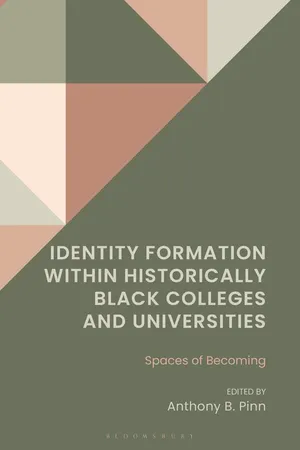
eBook - PDF
Identity Formation within Historically Black Colleges and Universities
Spaces of Becoming
- 193 pages
- English
- PDF
- Available on iOS & Android
eBook - PDF
Identity Formation within Historically Black Colleges and Universities
Spaces of Becoming
About this book
Drawing from institutional research, this book advocates for the ongoing importance of HBCUs and shows how their curriculum, programming, and self-understanding all point to education as a strategy for enhancing the whole person.
Over the years, historically Black colleges and universities (HBCUs) have played a significant role in the formation of Black identity in a society that struggles to appreciate difference. Bringing the vitality of these institutions to a larger public, high profile donors and advocates have served to safeguard the ongoing necessity of what HBCUs represent. Drawing on scholars from various disciplinary backgrounds, Anthony B. Pinn and the contributors explore the intersections of race and higher education through the lens of self-awareness and community awareness. The chapters tackle areas such as how HBCUs have handled focusing on (or not focusing on) Black history and Black cultural production in their courses, identity formation of international students at HBCUs, HBCUs contribution to identity formation in a global context-promoting Pan-Africanism, and how HBCUs promote healthy identity formation for Black students. Through institutional research, this book provides a uniquely layered and historical sensitive discussion of how HBCUs developed and their relationship to issues of Blackness and personhood.
Over the years, historically Black colleges and universities (HBCUs) have played a significant role in the formation of Black identity in a society that struggles to appreciate difference. Bringing the vitality of these institutions to a larger public, high profile donors and advocates have served to safeguard the ongoing necessity of what HBCUs represent. Drawing on scholars from various disciplinary backgrounds, Anthony B. Pinn and the contributors explore the intersections of race and higher education through the lens of self-awareness and community awareness. The chapters tackle areas such as how HBCUs have handled focusing on (or not focusing on) Black history and Black cultural production in their courses, identity formation of international students at HBCUs, HBCUs contribution to identity formation in a global context-promoting Pan-Africanism, and how HBCUs promote healthy identity formation for Black students. Through institutional research, this book provides a uniquely layered and historical sensitive discussion of how HBCUs developed and their relationship to issues of Blackness and personhood.
Frequently asked questions
Yes, you can cancel anytime from the Subscription tab in your account settings on the Perlego website. Your subscription will stay active until the end of your current billing period. Learn how to cancel your subscription.
No, books cannot be downloaded as external files, such as PDFs, for use outside of Perlego. However, you can download books within the Perlego app for offline reading on mobile or tablet. Learn more here.
Perlego offers two plans: Essential and Complete
- Essential is ideal for learners and professionals who enjoy exploring a wide range of subjects. Access the Essential Library with 800,000+ trusted titles and best-sellers across business, personal growth, and the humanities. Includes unlimited reading time and Standard Read Aloud voice.
- Complete: Perfect for advanced learners and researchers needing full, unrestricted access. Unlock 1.4M+ books across hundreds of subjects, including academic and specialized titles. The Complete Plan also includes advanced features like Premium Read Aloud and Research Assistant.
We are an online textbook subscription service, where you can get access to an entire online library for less than the price of a single book per month. With over 1 million books across 1000+ topics, we’ve got you covered! Learn more here.
Look out for the read-aloud symbol on your next book to see if you can listen to it. The read-aloud tool reads text aloud for you, highlighting the text as it is being read. You can pause it, speed it up and slow it down. Learn more here.
Yes! You can use the Perlego app on both iOS or Android devices to read anytime, anywhere — even offline. Perfect for commutes or when you’re on the go.
Please note we cannot support devices running on iOS 13 and Android 7 or earlier. Learn more about using the app.
Please note we cannot support devices running on iOS 13 and Android 7 or earlier. Learn more about using the app.
Yes, you can access Identity Formation within Historically Black Colleges and Universities by Anthony B. Pinn in PDF and/or ePUB format, as well as other popular books in Politics & International Relations & Higher Education. We have over one million books available in our catalogue for you to explore.
Information
Table of contents
- Cover
- Half Title
- Title Page
- Copyright Page
- Conents
- Illustrations
- List of Contributors
- Acknowledgments
- Introduction
- Part I: International Perspectives
- Part II: Domestic Perspectives (US)
- Conclusion
- Index